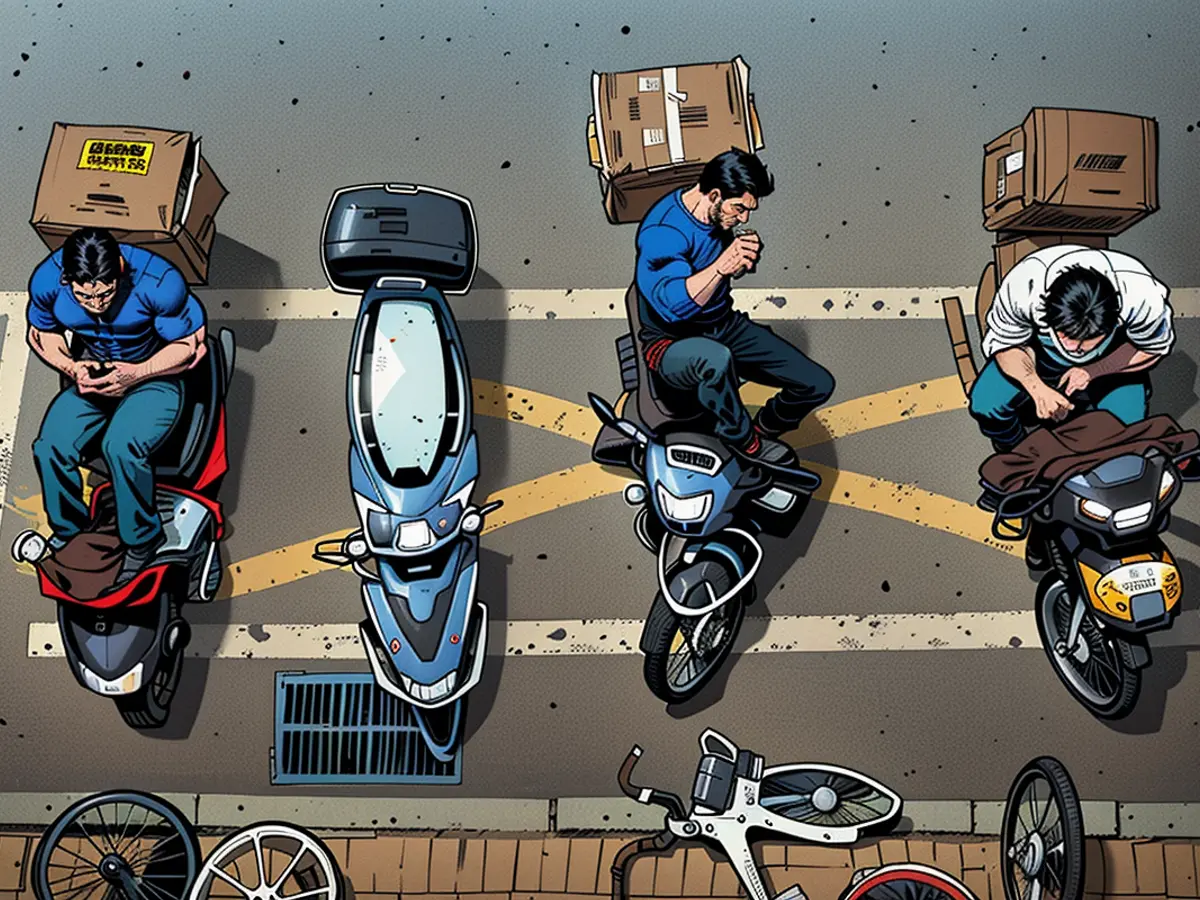"Experiencing High Stress": Reason Behind the Breakdowns of Drivers in the Largest Global Food Delivery Marketplace
Another delivery worker drops to his knees to apologize to an officer who halts him for disregarding a traffic light, subsequently jumping up, violently toppling his motorbike, and dashing across the bustling road without regard for traffic rules.
In another occurrence, a throng of frustrated drivers gathers outside a housing complex, demanding justice for a fellow delivery worker alleged to be mistreated by the complex's security personnel.
These instances are among numerous contentious encounters between delivery workers and authorities in China that have gone viral on Chinese social media, highlighting the strain on the general public.
The $200 billion industry, the world's largest based on revenue and number of orders, saw its growth surge by more than 100% during the three-year period of Covid-19 lockdowns, initially providing stable income for casual workers. However, things have changed.
With China's economy grappling with a prolonged property crisis and stunted consumer spending, delivery workers are bearing the brunt.
"They are working long hours, really feeling the squeeze," said Jenny Chan, an associate sociology professor at Polytechnic University of Hong Kong. "And they will continue to face pressure as platforms need to keep costs low," she added.
The slowdown in the economy has reduced people's spending on meals, resulting in lower earnings for workers as most of them work on commission, compelling them to work even longer hours to maintain their earnings, as per Chan.
Additionally, the dominance of two major food delivery platforms enables them to dictate contractual terms, leaving little room for workers to contest deteriorating working conditions, according to labor rights watchers.
The backbone of the industry
Approximately 12 million drivers form the foundation of China's extensive food delivery network, which gained popularity following the 2009 founding of the app Ele.me, now under the ownership of tech giant Alibaba (BABA).
During lockdowns, delivery workers played a pivotal role in keeping communities supply-sufficient, providing meals to residents confined to their homes. Now, they are an indispensable part of the country's food culture.
They are ubiquitous: navigating the country's extensive network of busy streets and narrow back alleys riddled with traffic to ensure timely meal delivery every day. Rain or shine, these dedicated workers deliver without a break.
In 2023, the market reached $214 billion, more than double what it was in 2020, according to estimations by iiMedia Research, a China-based firm tracking consumer trends. The industry is projected to reach $280 billion in 2030, making China home to the world's biggest takeout delivery market, according to Morningstar.

These days, workers find themselves under mounting pressure to meet tight deadlines, even if it means disregarding road regulations – such as speeding or running red lights – increasing risks for both themselves and other road users.
The rider who shattered his phone defended himself in an interview with Chinese state media, asserting that the charges against him were unfounded. However, he admitted to facing reduced assignments, affecting his income.
"What are they after? Do they want me dead?" he asked in the video.
In 2023, profits at two of the industry's major players, Meituan and Ele.me, soared. Meituan's revenue stood at $10 billion, marking a 26% increase from 2022. Alibaba reported revenues of $8.3 billion for its local services division, primarily driven by Ele.me, a 19% increase from the previous year.
CNN reached out to both Meituan and Ele.me for comment but did not receive a response.
Diminishing paychecks
Against this backdrop, delivery workers' income has diminished. In 2018, they averaged more than $1,000 per month. However, by 2023, their average monthly earnings dropped to less than $950, according to the China New Employment Research Center.
The issue is that although wages have decreased, many now put in longer hours. Lu Sihang, 20, told CNN that he works a 10-hour shift delivering 30 meals per day. He earns between $30 and $40 per shift. At this rate, Lu must work nearly every day to meet the $950 average wage.
China's reduced spending is to blame, says Gary Ng, an economist with French investment bank Natixis. As China's economy falters, consumers spend less.
The economist explained that even though food is a basic necessity, a struggling economy results in less spending on delivery orders, forcing restaurants to reduce prices to attract customers.
This erodes delivery workers' income because their pay is typically tied to a commission based on the price of the order. When customers tighten their belts, they are also less likely to tip.
Meanwhile, the sluggish economy has also increased unemployment, making the job market more competitive. China's youth unemployment rate surged to 18.8% in August, the highest since the methodology was updated last year to exclude students.

"If you have an oversupply of workers, their bargaining power decreases. Meanwhile, there are only a limited number of delivery orders to share among them," Ng said.
A dominant duopoly
Research by China Labour Bulletin, a Hong Kong-based NGO, revealed that delivery apps initially offered higher wages to attract enough workers for their expansion.
However, as market conditions have shifted – with platform companies consolidating the market and algorithm development controlling the labor process – delivery workers have lost critical labor protections and their ability to negotiate deteriorating working conditions.
At Polytechnic University, Chan noticed that tech companies initially spent a lot to crush competition by offering low prices. However, once they established their monopoly, they started passing on their costs to the delivery workers by reducing their bonuses and wages.
This year, Workers.cn, a state-owned news site, reported instances where drivers were penalized for actions beyond their control. For example, a driver was fined 86 yuan ($12) for not picking up an order due to the restaurant's delay in preparing the food.
According to Chan, another issue is that delivery workers are typically classified as freelancers, paid per trip, instead of receiving a regular salary. This motivates them to disregard hazardous road conditions in order to complete as many deliveries as possible.
"Who would risk running a red light if they could deliver safely? But they can't afford not to," Chan explained.
Sadly, these risky behaviors have resulted in tragic incidents. In 2019, a delivery worker lost his life after being hit by a tree blown over by strong winds in Beijing, reported Global Times.
More recently, on October 9, Chongqing Broadcasting Group aired footage of a delivery person recklessly driving his scooter into a car after disregarding a red light in the southern Chinese province of Hunan.
Yang, a 35-year-old delivery worker who only goes by his surname, acknowledged the drawbacks but still finds the job suitable for now. He has a history of various jobs, from snack selling to office work.
"It's a flexible job. If you want to make more money, you can work longer hours. If you want to rest, you can work less," Yang said.

In this competitive industry, delivery companies rely heavily on their workforce of 12 million drivers to meet demand, with revenue exceeding $280 billion by 2030. However, as economic conditions worsen and consumer spending decreases, delivery workers are facing increased pressure to meet tight deadlines, sometimes disregarding traffic rules for fear of losing assignments.
Despite the risks, many delivery workers continue to endure long hours and reduced pay, as their income is often tied to commissions based on order prices. This situation is compounded by the dominance of two major food delivery platforms, which control the market and can dictate contractual terms, leaving little room for negotiation on working conditions.








